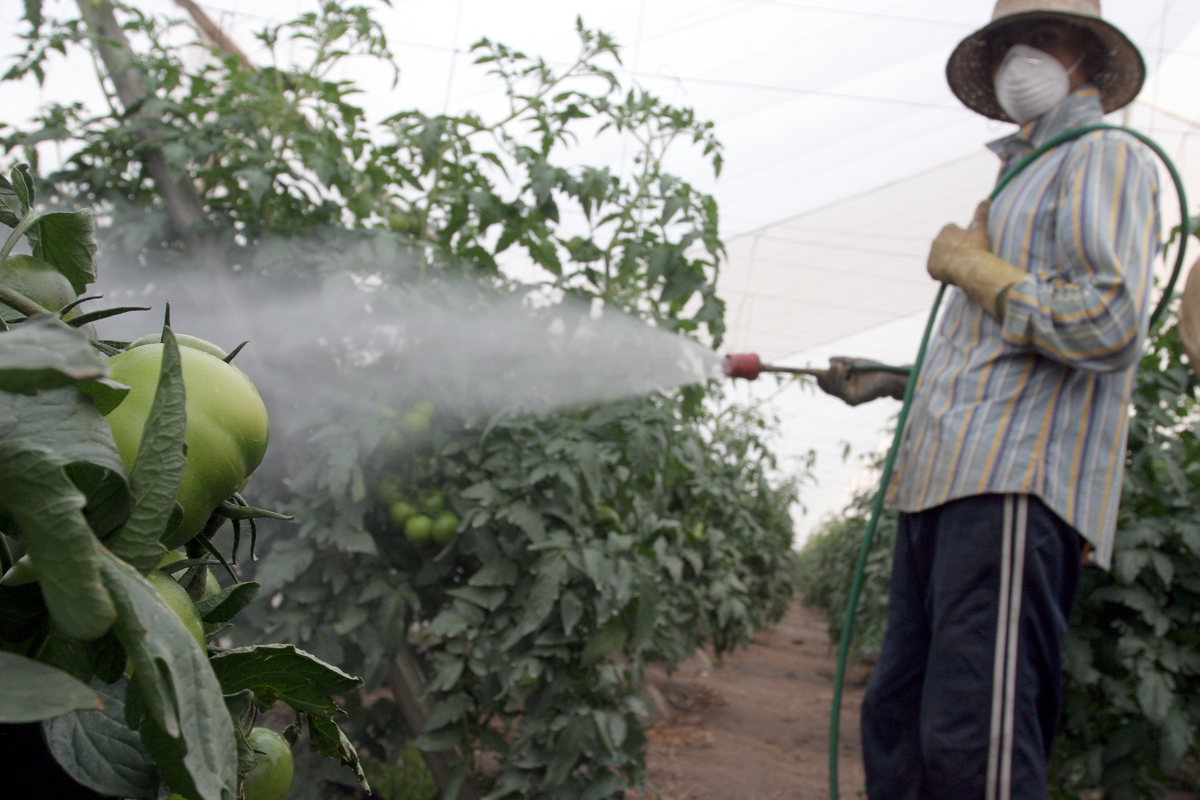How pesticides affect farmers’ and our health.

A worker without protective clothing only wearing a paper breathing protection sprays pesticides on vegetables in a greenhouse.
At Greenpeace we have been campaigning against the use of chemical pesticides in agriculture for a long time. Not only because they are not necessary for food production, in fact ecological pest management is successfully implemented around the world, but also because these chemicals have an impact on our health. So, we decided to investigate the current literature on the health impacts of common pesticides used today by industrial agriculture. The findings outlined in this report are grim reading.
Historically, since the 1950s industrial agriculture has been increasingly reliant on the use of fertilisers and pesticides to produce low cost food – a short-term solution for a large-scale need. With larger field sizes and a reduction in the diversity of habitats for natural pests, the use of pesticides has become routine. In most cases it is even preemptive – dosing the fields with a cocktail of chemicals before there is a pest problem. Agricultural workers, and their families are exposed to these toxic substances throughout their working lives. However, proving that a substance definitively causes a disease is difficult. There are no members of the population that are completely unexposed, and most diseases have multiple causes. Also, most people are exposed to a mixture of chemicals in their everyday lives, not just pesticides.
Whilst recognizing these uncertainties and the sometimes conflicting research, taken together the evidence is clear. The use of pesticides by industrial agriculture is undermining the health of our farmers, their families and the general population.
Most vulnerable to the effects of pesticides are the farmers that are in contact with them regularly. Even wearing protective clothing can result in low-level exposure, which in some cases can still be harmful. This is especially true for those women working in farming that are pregnant – this exposure can impact on the health of their babies with possible birth defects, developmental issues and cancers as a consequence. Children are also particularly vulnerable to the effects of harmful pesticides. Their bodies are undergoing constant development and are not able to metabolise some substances in the way that adults can. Also children are exposed to pesticides in different ways – through the food they eat, things that they touch and put in their mouth, and on the surfaces of the garden and house, as well as through the air they breathe.
For adults, studies have related pesticide exposure to an increased incidence of several cancers – including prostate, lung and others – and neurodegenerative diseases such as Parkinson’s and Alzheimer’s. There is also evidence that suggests that certain pesticides can disrupt normal immune system functioning and hormones in the body. There are people that, because of their genetic makeup, are more likely to be affected by the toxic impact of pesticides and it is possible that some of these impacts on the body can follow onto future generations. This means that even though those in the future might not be exposed to these chemicals, they might still be affected because their grandparents were in contact with certain chemicals.
Currently in our everyday lives we are exposed to a cocktail of toxic chemicals, the impact of which is impossible to evaluate. There is a solution but it involves a fundamental shift from an industrial agriculture system to ecological farming that grows healthy food using the benefits of the diversity it creates. It can be done, and farmers are doing it. Ecological farming is the only solution to grow healthy food and protect our farmers, their families and our children.
If you are outraged about the findings of the report and want to do something to eliminate the use of chemicals in agriculture and contribute to change the food system, join the food movement and make a challenge today.
Kirsten Thompson is a scientist specialising in conservation ecology and biodiversity. She had been involved in research for more than 20 years, working with both universities and non-government organisations. She feels that we can use good science and innovative thinking to preserve the natural world, not just for humans, but for all species. Kirsten and her family grow fresh and healthy food as a way of ensuring local, sustainable produce alongside educating her children with an important lifelong skill.
